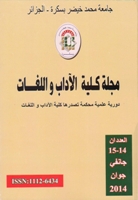How Language Learning Shapes Thinking "An Overview of learning from Pavlov to Vygotsky"
Résumé
إن تعلم أو تعليم اللغة لمن أولوية الأولويات بالنسبة لأية منظمة مسئولة على الثقافة و العلوم و التربية في العالم. فانتشار اللغات الأجنبية بسرعة و على رأسها الانجليزية, التي أصبح لا مفر منها اليوم, أدى إلى العديد من الإصلاحات فيما يخص البرامج التربوية كمحاولة للالتحاق بالركب و التأقلم مع الأوضاع الجديدة. فالانجليزية و قد أصبحت لغة التكنولوجيا, ينظر إليها البعض كوسيلة للاستعمار و عدم الاستقرار و خاصة فيما يخص الثقافة والهوية, لكنها في الوقت نفسه تفرض نفسها بطرق مختلفة. وبغض النظر عن المخاوف المذكورة سابقا فإن تعلم اللغات الأجنبية يهدف أساسا إلى خدمة الطلبة. فهو يضمن لهم الحصول على المعلومات بسهولة و يشجعهم على مواصلة الدراسة, و زيادة على كل ذلك فهو يسهل لهم معرفة الآخر أي العالم الخارجي و الشعوب التي تسكنه. و لكي نستطيع إبراز الأهداف البعيدة لتعلم اللغات يجب علينا الكشف عن حقيقة الدور الريادي للغات في الوقت الحالي. ومن خلال هدا البحث المتواضع, فإنني سأحاول أن أبين كيف أن حياة شخص بأكملها تتغير بمجرد تعلم لسان جديد.
Language learning is the focal point of any organisation responsible for culture, science, and education in the world. The widespread of foreign languages such as English, which has become inevitable in recent years, has led to the adaptation of many changes in syllabuses as an attempt to cope with the new situation. English, the language of technology today, is also viewed as an alien in because it may threaten the stability of a whole culture. It is then not only an ambition, but also a need; it ranges between choice and obligation. Regardless of these fears, the learning of foreign languages aims at serving students in many different ways. It secures for them an easy and a smooth access to data bases; it encourages them to proceed in their studies; and above all it helps them to know more about the other societies. To be able to reach the ultimate goals of language learning, we must uncover some of the truth behind and beyond its current role and vitality. It is within the scope of the present article that I try to demonstrate how a person's life changes because of a new tongue.
Références
2- Brown, H Douglass. Principles of language learning and teaching.
5th ed. New York: Pearson Education, 2007.
3- Cohen, Louis, Lawrence Manion and Keith Morrison. Research
Methods in Education. 5th ed. London : RoutledgeFalmer, 2004.
4- Farrell, Thomas S. C. and George M. Jacobs. Essentials for
Successful English Language Teaching. London: Continuum,
2010.
5- Finch, G. How to study linguistics. Hounmills: Palgrave
Macmillan,1998.
6- Hale,Elizabeth. Crafting Writers K-6, Portland, Maine: Stenhouse
Publishers, 2008.
7- Harkin, Joe, Gill Turner, and Trevor Dawn. Teaching youg adults:
A handbook for Teachers in Post-compulsory Education. London:
RoutledgeFalmer, 2001.
8- Hill, Jane D. and Kathleen. M. Flynn. Classroom Instruction that
Works with English Language Learners. Virginia: Association for
Supervision and Curriculum Development (ASCD), 2006.
9- Jordan, Anne, Orison Carlile and Annetta Stack. Approaches to
Learning: A Guide For Teachers. England: Open University Press,
2008.
10- Kukulska-Hulme, Agnes. Language and Communication:
Essential Concepts for User Interface and Documentation Design.
New York: OUP, 1999.
11-Langer, Judith A. and Applebee, Arthur N. How Writing Shapes
Thinking: A Study of Teaching and Learning. Illinois: National
Council of Teachers of English, 1987.
12-"learning." Encyclopædia Britannica. Chicago: Encyclopædia
Britannica, 2010.
13-Leech, G, Deuchar, M, and Hoogenraad, R, English Grammar for
Today: A new Introduction. Hampshire: Macmillan, 1982.
14-McLeod, Joyce, Jan Fisher, and Ginny Hoover. The key elements
of classroom management: Managing time and space, student
behavior, and instructional strategies. Virginia: ASCD, 2003.
15- Morley, David. The Cambridge Introduction to Creative Writing.
Cambridge: CUP, 2007.
16- Seifert, Kelvin and Rosemary Sutton. Educational Psychology. 2nd
ed. Zurich: Global Text, 2009.
17-Tan, Al-Girl, ed. Creativity: A Handbook for Teachers. Singapore:
World Scientific Ltd, 2007.
18-Tauber, Robert T. Classroom management : Sound Theory and
Effective Practice. 4th ed. Connecticut: Praeger Publishers, 2007.
19-Yule, George. The study of language. Cambridge: OUP, 1996.


